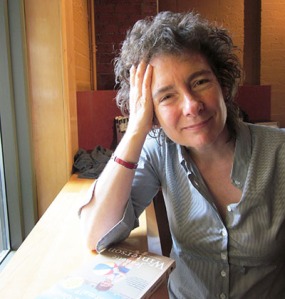- Claire McAlpine
- Why Be Happy When You Could Be Normal? #adoption #memoir

 This stylised memoir, set in the working-class north of England, is the book Jeanette Winterson wasn't ready to write back in 1985 when at 25 years of age, she wrote the novel Oranges Are Not the Only Fruit, a book that plunged the reader into her universe, one that provided the author the liberty of narrating freely, without the confines of the story having to have been exactly as she had lived it - it was fiction, an imagined story, and she named the main character Jeanette, a provocative gesture for sure.
This stylised memoir, set in the working-class north of England, is the book Jeanette Winterson wasn't ready to write back in 1985 when at 25 years of age, she wrote the novel Oranges Are Not the Only Fruit, a book that plunged the reader into her universe, one that provided the author the liberty of narrating freely, without the confines of the story having to have been exactly as she had lived it - it was fiction, an imagined story, and she named the main character Jeanette, a provocative gesture for sure.
It was indeed inspired by her own experience, as we discover when she braved it and published this memoir nearly 30 years later (her adopted mother no longer living or able to be disapproving of her work), providing for the title, a quote from the mother who had been unable to shape the little human she acquired into her version of a normal daughter.
In her memoir she allows the real life characters to reveal parts of themselves, in particular Jeanette and the woman who raised her, whom she refers to as Mrs Winterson (her adoptive mother), a telling detail in itself, that she reserves the title of mother for the woman who is a shadowy illusion for most of the narrative; not there, not looked for, a vague presence in her psyche that she continuously rejects the thought of, her biological mother. I did wonder whether this was a literary invention or whether she actually did refer to her adoptive mother as Mrs W. It makes quite a statement.
'I do not know why she didn't/couldn't have children. I know that she adopted me because she wanted a friend (she had none), and because I was like a flare sent out into the world - a way of saying that she was here - a kind of X marks the spot.
She hated being a nobody, and like all children, adopted or not, I have had to live out some of her unlived life. We do that for our parents - we don't really have any choice.'
Despite what was likely to have been a desperate desire for a child, Mrs W. dolled out punishments and criticisms more than any form of affection or love for her chosen child. When her mother was angry with her, Mrs W. often repeated one of her preferred biblical phrases "The Devil lead us to the wrong crib". The Church was like family (though unsuccessful in helping them make friends) and the Bible one of only five books in the house, the one referred to most often. The most regular punishment however, was to lock her in the coal-scuttle or out on the door stoop - for the whole night.
'Dad's on the night shift, so she can go to bed, but she won't sleep. She'll read the Bible all night, and when Dad comes home, he'll let me in, and he'll say nothing, and she'll say nothing, and we'll act like it's normal to leave your kid outside all night, and normal never to sleep with your husband. And normal to have two sets of false teeth, and a revolver in the duster drawer...'
It is a collection of anecdotes, written in a way to make the reader present, it's not like reading an account of the past, it's reliving days in the life of this fierce little battler, a girl who had a zest for life, who used her locked up time to invent imaginary characters, who made up stories, who forged her own personality through, who would not be tamed, who left home while still at school, taught herself to drive, lived in a car for a while and remarkably pushed herself forward as one of the 'experimental' working-class contenders for a place at Oxford University and succeeded.
Her experience with Mrs Winterson is told with as much compassion as is possible, the facts related in a way that leaves the reader to judge and most will wonder why Mrs Winterson desired a child or was deemed fit to be given one at all.
It is an extraordinary account of childhood and growing up, of what home is, of how we perceive and learn love, of adoption, of how those formative years contribute into making us what we will become and that mysterious 'other life' that might have been, when you've been switched to alternative parentage post birth.
I never wanted to find my birth parents - if one set of parents felt like a misfortune, two sets would be self-destructive. I had no understanding of family life. I had no idea that you could like your parents, or that they could love you enough to be yourself.
I was a loner. I was self-invented. I didn't believe in biology or biography. I believed in myself. Parents? What for? Except to hurt you.
It is also a tribute to literature and to the power of stories to influence lives, whether they are an escape for those who need refuge and to understand the world around them, or whether they are the occupation of the oppressed, a creative outlet for someone with nothing but their imagination to keep them entertained while enduring their struggle.
Click Here to Buy a Copy of Why Be Happy When You Can Be Normal?
Note: Jeanette Winterson, Photo by Sanhita SinhaRoy
Writing Status Badges












Writing Status Badges












Featured Members (7)
Writing Status Badges














































Sounds excellent! I completely identify with believing only in myself. I often mistakenly refer to Jeannette Winterson as the author of The Glass Castle (another memoir I loved!) and am delighted to see that the name I invented is actually a real person and a writer, no less.